Constitutional Scholar, Professor Randy Barnett, Autographs Three of His Books!
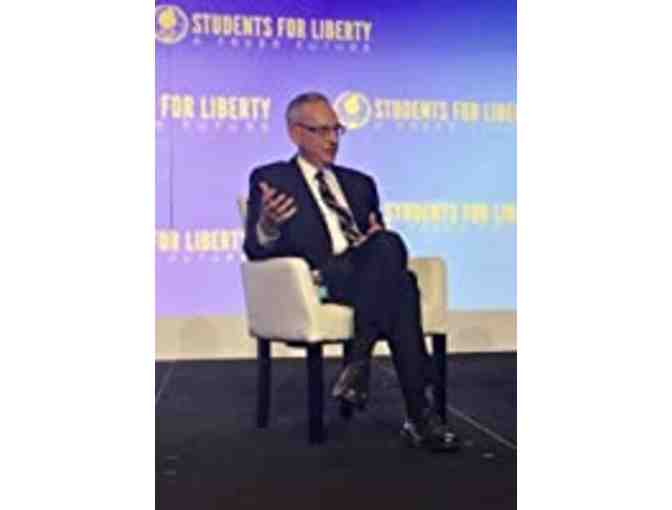
Item Number: 308
Time Left: CLOSED
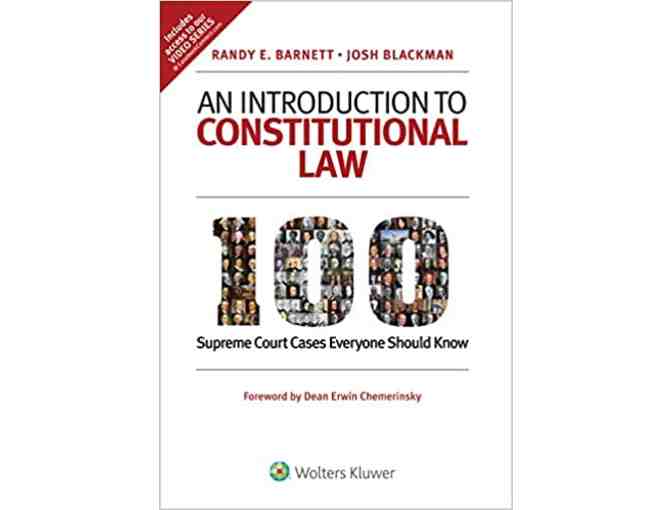
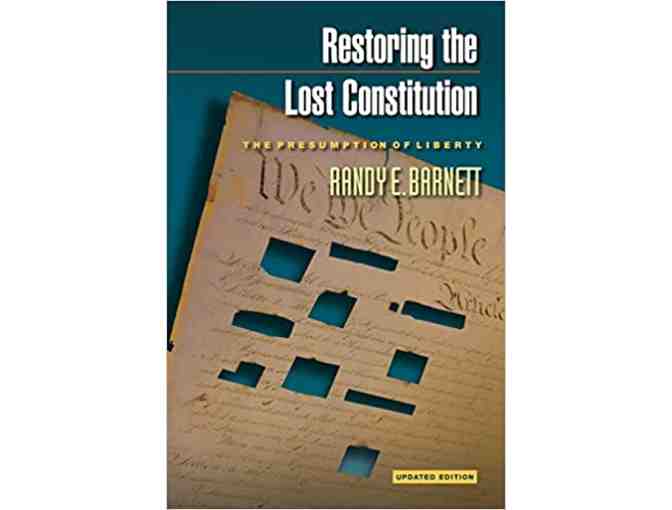
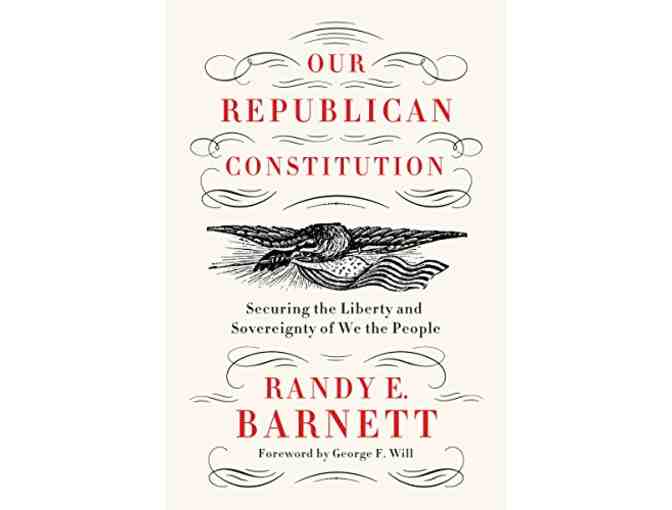
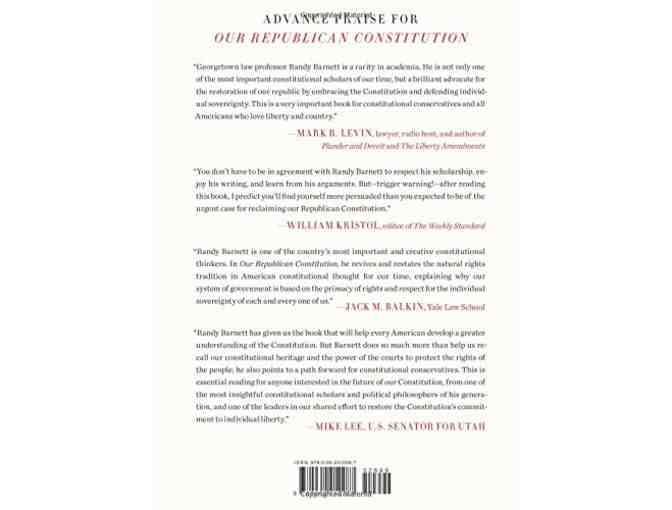
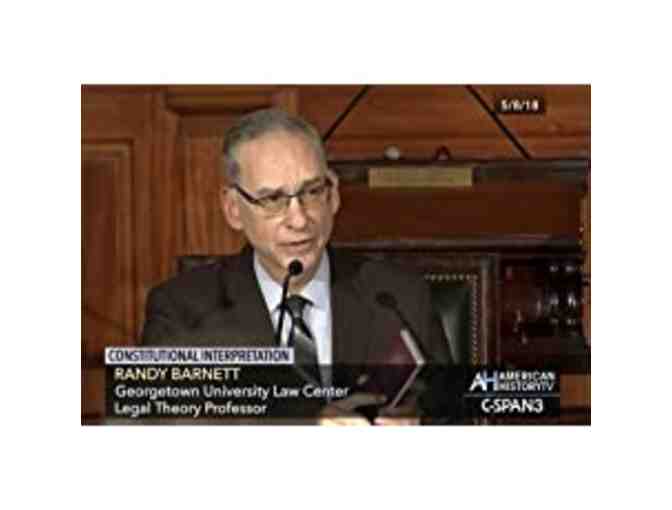
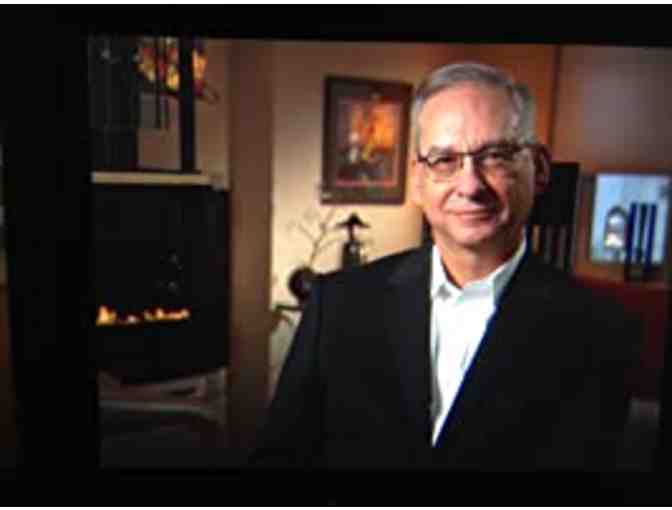
Description
We are so very proud to have Professor Randy Barnett as a friend of Constituting America! The following three books will be autographed and mailed to winning bidder for a treasured place in your lives and library. Professor Randy Barnett, Director of Georgetown University's Constitution Center autographs: "An Introduction to Constitutional Law," "Our Republican Constitution - Securing the Liberty and Sovereignty of We the People" and "Restoring the Lost Constitution: The Presumption of Liberty."
Free shipping!
Professor Barnett writes, "We've made the book, "An Introduction to Constitutional Law" accessible for all levels of study: law school,college, high school, home school, and independent study."
"An Introduction to Constitutional Law" 2019:
"This multimedia platform combines a book and video series that will change the way you study constitutional law. An Introduction to Constitutional Law teaches the narrative of constitutional law as it has developed over the past two centuries. All students even those unfamiliar with American history will learn the essential background information to grasp how this body of law has come to be what it is today. An online library of sixty-three videos (access codes provided with purchase of the book) brings the Supreme Court's one hundred most important decisions to life.
These videos are enriched by photographs, maps, and even audio from the Supreme Court. The book and videos are accessible for all levels: law school, college, high school, home school, and independent study. Students can read and watch these materials before class to prepare for lectures or study after class to fill in any gaps in their notes. And, come exam time, students can watch the entire canon of constitutional law in about twelve hours."
"Our Republican Constitution: Securing the Liberty and Sovereignty of We the People" 2016:
"A concise history of the long struggle between two fundamentally opposing constitutional traditions, from one of the nation’s leading constitutional scholars—a manifesto for renewing our constitutional republic.
The Constitution of the United States begins with the words: “We the People.” But from the earliest days of the American republic, there have been two competing notions of “the People,” which lead to two very different visions of the Constitution.
Those who view “We the People” collectively think popular sovereignty resides in the people as a group, which leads them to favor a “democratic” constitution that allows the “will of the people” to be expressed by majority rule. In contrast, those who think popular sovereignty resides in the people as individuals contend that a “republican” constitution is needed to secure the pre-existing inalienable rights of “We the People,” each and every one, against abuses by the majority.
In Our Republican Constitution, renowned legal scholar Randy E. Barnett tells the fascinating story of how this debate arose shortly after the Revolution, leading to the adoption of a new and innovative “republican” constitution; and how the struggle over slavery led to its completion by a newly formed Republican Party. Yet soon thereafter, progressive academics and activists urged the courts to remake our Republican Constitution into a democratic one by ignoring key passes of its text. Eventually, the courts complied.
Drawing from his deep knowledge of constitutional law and history, as well as his experience litigating on behalf of medical marijuana and against Obamacare, Barnett explains why “We the People” would greatly benefit from the renewal of our Republican Constitution, and how this can be accomplished in the courts and the political arena."
"Restoring the Lost Constitution: The Presumption of Liberty" 2005:
"The U.S. Constitution found in school textbooks and under glass in Washington is not the one enforced today by the Supreme Court. In "Restoring the Lost Constitution," Randy Barnett argues that since the nation's founding, but especially since the 1930s, the courts have been cutting holes in the original Constitution and its amendments to eliminate the parts that protect liberty from the power of government. From the Commerce Clause, to the Necessary and Proper Clause, to the Ninth and Tenth Amendments, to the Privileges or Immunities Clause of the Fourteenth Amendment, the Supreme Court has rendered each of these provisions toothless. In the process, the written Constitution has been lost.
Barnett establishes the original meaning of these lost clauses and offers a practical way to restore them to their central role in constraining government: adopting a "presumption of liberty" to give the benefit of the doubt to citizens when laws restrict their rightful exercises of liberty. He also provides a new, realistic and philosophically rigorous theory of constitutional legitimacy that justifies both interpreting the Constitution according to its original meaning and, where that meaning is vague or open-ended, construing it so as to better protect the rights retained by the people.
As clearly argued as it is insightful and provocative, Restoring the Lost Constitution forcefully disputes the conventional wisdom, posing a powerful challenge to which others must now respond.
This updated edition features an afterword with further reflections on individual popular sovereignty, originalist interpretation, judicial engagement, and the gravitational force that original meaning has exerted on the Supreme Court in several recent cases."
About Professor Randy E. Barnett:
"Randy E. Barnett is the Carmack Waterhouse Professor of Legal Theory at the Georgetown University Law Center, where he teaches constitutional law and contracts, and is Director of the Georgetown Center for the Constitution. After graduating from Northwestern University and Harvard Law School, he tried many felony cases as a prosecutor in the Cook County States' Attorney's Office in Chicago. A recipient of a Guggenheim Fellowship in Constitutional Studies, Professor Barnett has been a visiting professor at Penn, Northwestern and Harvard Law School.
Professor Barnett's publications includes twelve books, more than one hundred articles and reviews, as well as numerous op-eds. In 2004, he argued the medical marijuana case of Gonzalez v. Raich before the U.S. Supreme Court. In 2012, he was one of the lawyers representing the National Federation of Independent Business in its constitutional challenge to the Affordable Care Act. Recently, he appeared on PBS's Constitution USA with Peter Sagal; and he portrayed a prosecutor in the 2010 science-fiction feature film, InAlienable."
Editorial Reviews:
"The descriptions by Professors Barnett and Blackman emphasize what students need to know in order to master this material for their exams and for their careers. Professors Barnett andBlackman present the material with great clarity. The videos provide the students another way of learning the material and wonderfully complement the textual descriptions. Although many of the cases are controversial, Professors Barnett and Blackman present them in an unbiased and ideologically neutral manner."
- Erwin Chemerinsky, University of California, Berkeley School of Law
"Randy Barnett and Josh Blackman have created a remarkable guide to what they label the 100most important Supreme Court cases in our history. Students (and their teachers) should especially profit from the multimedia blend of information and analysis. Inevitably there will be quibbles about some few cases included and, therefore, others left out, but if I am typical, most legal academics will agree with at least 90% of their choices, which is impressive indeed. This may prove to be a true event in legal education--and not only for law students."
- Sanford V. Levinson, University of Texas at Austin School of Law
"Barnett and Blackman have made learning the basics of American constitutional law as painless and as fun as possible. The case discussions are concise; the videos are full of fascinating pictures and historical details. If you think you might be interested in Constitutional Law, this is a great way to get started."
- Jack M. Balkin, Yale Law School
"The pithy, lively, and occasionally opinionated, but always fair-minded chapters and videos pro-vide all of the essentials of the key cases of the constitutional canon, clarifying and summarizing without ever dumbing down."
- Michael Dorf, Cornell Law School
"A very accessible guide by two outstanding constitutional scholars to many cases that are taught in almost every class in constitutional law and a few cases that should be taught in almost every class in constitutional law."
- Mark Graber, University of Maryland School of Law
"A useful, impressive, and innovative introduction to the history of American constitutional law. Accessible to the beginning student and still helpful to the advanced student. A new approach for a new generation of students. Raises the bar on how to make these complex cases understandable."
- Keith E. Whittington, Princeton University
"Randy Barnett and Josh Blackman have done it again! Two of our nation's most brilliant scholars and teachers of the Constitution have teamed up to create a magnificent set of new teaching materials. 100 Supreme Court Cases Everybody Should Know is an endlessly rich and deeply rewarding resource for understanding the U.S. Constitution. Novices and experts alike will benefit from the Barnett-Blackman treasure trove."
- Michael Stokes Paulsen, University of St. Thomas School of Law
"A strong supplement that provides the legal and political context for the most significan tSupreme Court cases. It provides important background for all constitutional law students."
William Baude, University of Chicago Law School
Note From the Author:
"We developed this multimedia platform to innovate how constitutional law is studied. First, An Introduction to Constitutional Law will teach you the narrative of constitutional law as it has developed over the past two centuries. All students -even those unfamiliar with American history-will learn the essential background information to grasp how this body of law has come to be what it is today. Second,the online video library will bring to life the 100 Supreme Court Cases EveryoneShould Know. To make the content more engaging, we've embedded photographs,maps, and even audio from the Supreme Court.
We've made the book and videos accessible for all levels of study: law school, college, high school, home school, and independent study. Students can read and watch these materials before class to prepare for lectures. Or students can utilize the platform after class to fill in any gaps in their notes. And most likely, come exam time, students can binge-watch the entire canon of constitutional law in less than12 hours.
We hope you enjoy using An Introduction to Constitutional Law: 100 SupremeCourt Cases Everyone Should Know as much as we enjoyed preparing it."
Randy E. Barnett, Washington, D.C.
Josh Blackman, Houston, TX
July 2019